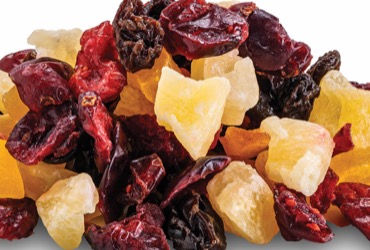SAN DIEGO—Your grandmother’s advice to eat prunes for better bowel regularity may be more than just an old wives’ tale, according to findings presented at DDW 2025. The investigators found that a four-week diet of daily dried fruit increased stool weight and frequency in patients with chronic constipation.
Supplemental fiber is included in most clinical guidelines on functional constipation, but studies quantifying its effects are scare. This led study author Simon Steenson, PhD, a nutritionist at King’s College, in London, and his colleagues to get a better handle on the role of dried fruit in constipation.
“One in 10 people globally suffer from constipation, and it’s likely that figure could be higher,” Dr. Steenson told Gastroenterology & Endoscopy News. “We have these recommendations to increase fiber intake. What we don’t really have, though, is a lot of evidence or trials to really show whether it actually is effective.”
The investigators assigned a group of adults with chronic constipation and a daily fiber intake of less than 30 g to receive either 90 g of dried prunes, apricots and raisins (n=47), 514 mL of prune, grape and apricot juice (n=44), or a fruit-flavored sugar placebo (n=49). Patients with a major medical condition, those who frequently take rescue laxatives or who are on medications known to affect gut function were excluded from the study, as were those with a sulfite allergy (a preservative used in dried fruit) or who already consumed at least three fruit products a week. Participants completed two 7-day food diaries and occasional questionnaires and received weekly compliance calls.
The primary end point was change in stool sample weight, as measured by seven-day total stool collection at the start and after four weeks of the intervention. Patients in the dried fruit group experienced a significant mean (±SD) stool weight increase of 21.2±38.7 g per day (P=0.021), those in the juice group showed a 13.2±40.2 g per day increase and the placebo group had a 1.6±25.8 g per day increase.
“This is the largest study to date, as far as we’re aware, that’s actually providing some really good quality clinical trial evidence to show that this lifestyle, food-based approach might have some real benefit for people,” Dr. Steenson said. “We found after four weeks that the dried fruit increased the bulk and the weight of people’s stools and, also, the number of bowel movements. They also reported that they had a better quality of life.”
Secondary outcomes of the study included frequency and type of bowel movements, stool water content, gastrointestinal symptoms, and quality of life. The researchers found that relative to placebo, dried fruit led to a significantly greater increase in complete (1.3 vs. 0.5) and complete spontaneous bowel movements (0.8 vs. 0.2) and improved quality of life scores (lower scores mean fewer negative effects) (dried fruit, –5.8±5.2 vs. placebo, –2.8±6.2; P=0.029). The juice arm also had an increase in spontaneous bowel movements compared with placebo (1.0 vs. 0.2).
Although a juice-based intervention did not significantly affect stool weight and frequency, it did increase stool water content relative to placebo (75.2%±7.1% vs. 68.8%±8.1% of stool weight). Dr. Steenson said further analyses of gut transit time and microbiome data are pending.
Calling the study design “excellent,” Satish Rao, MD, a professor of medicine at Augusta University Medical Center, in Georgia, said the data, in part, “confirm previous [trials] where we showed dried plums were better than psyllium fiber,” and that a fiber derived from plums, apples and apricots was superior to psyllium.
“This is very good news and reinforces most guidelines and, importantly, provides the much-needed evidence to back these guidelines,” said Dr. Rao, who was not involved in the study. “Being food products, they are safe and well tolerated.”
—Katie Prince
Drs. Rao and Steenson reported no relevant financial disclosures. Dr. Rao is a member of the Gastroenterology & Endoscopy News editorial board.
This article is from the July 2025 print issue.
